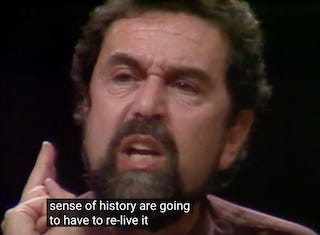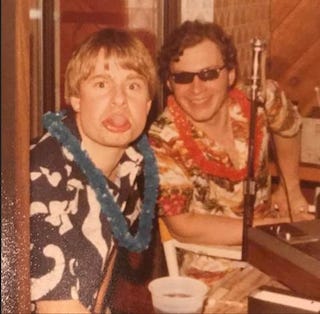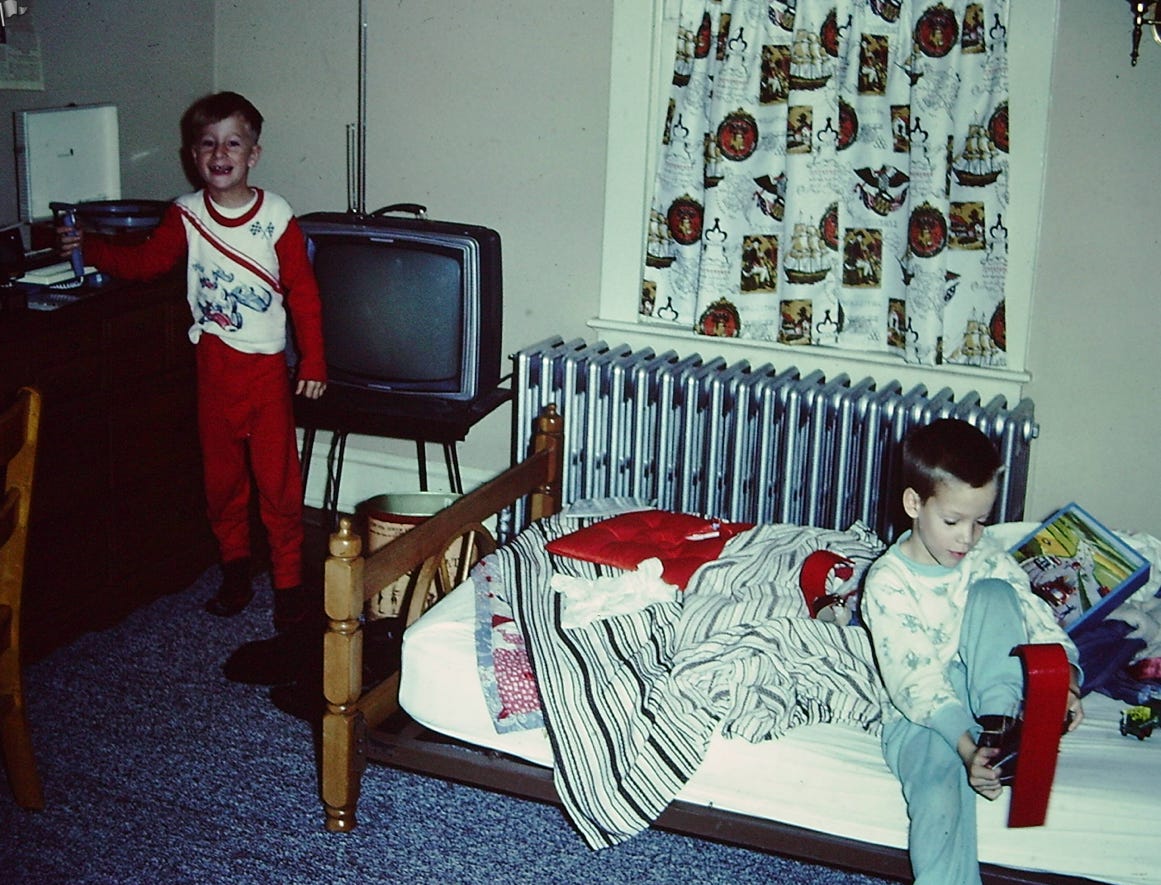The Opposite of Daytalking
Season 7, #3: Attentiveness is a lost art and, with practice, all yours
HERE’S WHAT I REALLY don’t get.
You can want to relate to someone, but you don’t care enough to be with them—however you imagine “being” to be: a quick phone call, a coffee date, a lunch catch-up, any of that. But if you don’t do that, it means you don’t care. Seriously, no thought.
You’re vapor to me. And me to you.
Plain and simple. Right?
Hang on, hang on. Not so simple, Simon. Press reset. Try again.
The real desire is company, presence. Being together. That’s what I mean when I use a term like Daytalking. It’s less about talking and hours on the clock. Furthermore it has some qualities that need teasing out. Let’s see if we can do that together.
For new subscribers to StoryShed, you may find this primer on Daytalking, Nightwalking, and Stargazing helpful (there are two parts to this and here is part one):
You Had the Key to Your Soul
“...there is no teacher, no pupil; there is no leader; there is no guru; there is no Master, no Savior. You yourself are the teacher and the pupil; you are the Master; you are the guru; you are the leader; you are everything.” —Jiddu Krishnamurti
Since we’re smack-dab in Season 7: Daytalking, I thought I’d revisit aspects of it (community, conversation, attention and deep listening, belonging and acceptance) …but I got sidetracked by something I’ll call “Seasonal Nightwalking.”
As it’s mid-January of a new year (and I began writing this at the end of the last one), I felt buried in a muddle (likely of my own making) since the holidays call up memories whether I want to remember them or not. And since everything changes, I waited it out and, after some good sleep and self-care, was rewarded with the energy I needed to get back on track with Daytalking.
So let’s jump into those aforementioned qualities.
Less Talk, More Day
Throughout my life I’ve been a terrible listener.
I couldn’t wait to have my say, so I got impatient with people. I wasn’t tuned in to their side at all.
However I think I’ve gotten better with age. How so? Well, given the times we’re currently living through—a freakin’ tsunami of distraction and transactional behaviors—and the fact I have way fewer long-term relationships that I had earlier in my life, I’ve done my best to train myself to bring self-awareness to any conversation.
I pause a lot. I think about how I want to interact in the conversation, listen to the other person more. For example just the other night I was out with a friend I see a lot but we were joined by his wife, who I rarely spend time with. I was curious about what was going on in her world, so I asked a lot of questions. It’s hilarious thinking about this because it reminds me of Wallace Shawn in My Dinner With Andre, where he remarks:
Asking questions always relaxes me. In fact, I sometimes think that my secret profession is that I'm a private investigator, a detective. I always enjoy finding out about people. Even if they are in absolute agony, I always find it very interesting.
Lol. “Even if they are in absolute agony,” he’s listening.
For the purposes of this post I’d intended to do more reading on deep listening, but it occurs to me that reading ain’t what’s really needed—it’s practice. What’s been tough is fewer people enjoy IRL interactions anymore. It’s frustrating because not getting together is only going to make attempts to practice listening more difficult, in the end.
And like anything in life, the more you practice something the better you get.
That’s the hope, anyway.
The More Things Change, Yadda Yadda Yadda
Just the other day I called my college friend Pat, just to chat and see if he could book in some hang time. He picked up the phone and we immediately started Daytalking:
Pat: *Over-stressed coughing and hacking sounds*
Me: *Responds with over-stressed coughing and hacking sounds*
[Laughter ensues.]
You see, there’s an excellence to knowing someone for many, many years: you can sync immediately with their conversational style. Of course that isn’t always 100% the case, but for the most part it is.
For me, that’s the essence of Daytalking: playfulness, a free-floating ability to accept the person for who they are at the same time enjoying their company.
It’s funny, but recently I ran across another photo that says more about things remaining the same, even as times have changed.
Did I ever enjoy Daytalking with my only brother?
He wouldn’t have the faintest idea what I’m talking about. You see, there were times in my young life where I felt I was dropped into my family by aliens. The above photo shows my brother and I likely in an upstairs bedroom we both shared at our first Christmas in Maryland. Brian is trying on new skis and I’m standing by three very important things: the television set, the phonograph, and a tape recorder.
To this day, Brian plays with physical things: cars, boats … skis … and I’m always around some form of media.
How is this Daytalking?
I’m not sure, but one thing I can say is it highlights the old adage, “the more things change, the more they stay the same.” The past nearly always surprises me. If I care to closely examine it, I always learn something. It might not be clear at first, but lingering with it can help. When you’re Daytalking, goofing around, letting someone in your circle playfully join in, you’re going to learn something.
No doubt.
But do you need other people to “engage in Daytalking”?
No, I don’t think so, and for a fundamental reason: Attitude.
Leo Buscaglia Is Dead, Long Live St. Leo
Back in the late 1970s, early ’80s, I watched a lot of television, and in particular PBS (in the U.S., our Public Broadcasting Service, which aired a variety of cultural programming, favorites being a live music program called Austin City Limits and James Burke’s fascinating science series Connections)—always hungry to learn new things.
One such program was Leo Buscaglia’s The Art of Being Fully Human. I’ve never forgotten it. There was always something vulnerable and yet fiercely strong about Buscaglia’s talks. They always seemed to come from a mysterious place far beyond however he presented himself as a living, breathing human being.
“When human love was invented, they didn’t give us an instruction manual.”
—Leo Buscaglia
I found him inspiring and, well, a bit daunting. I didn’t feel I could ever live up to that level of emotional vulnerability. But the thing that resonated with me was his agnosticism—distinctly focused on emotions and human relationship, and light on the psychology—all with great warmth and humor.
That’s what I mean by Daytalking.
If you focus on the “being with” and less about “what you’re saying” you’re getting closer to the mark. “When human love was invented,” Busgalia says in a talk, “they didn’t give us an instruction manual.”1
Later he describes teaching a class called “Love 1A.” He admitted, “Even if no one else shows up, I’ll be here. I’ll love myself.”

Folks, here’s how I know I’m in full Daytalking mode: I feel playful and open and attentive to whatever the world throws at me.
That hardball the world hurls might be derision, indifference, cynicism, heck, even hatred—the opposite of Daytalking. But if my inner attitude thermostat has been set to Daytalking, it acts like a protective barrier. I’m aware of what’s in the air, but I’m choosing to let it not affect me.
Is that wise?
I don’t know.
What do you think?
Extra texture and notes
Leo Buscaglia, “Speaking of Love” (PBS via YouTube)





I was a woeful listener too until I had to interview people for my job without a set list of questions. People tell you very quickly if you've heard them wrong in an interview!
Inspiring, Michael! I’m reminded of this scene from “Adaptation”… Even though it’s intended to have an element of tongue-in-cheek to it, I suspect the sentiment’s sincere: https://youtu.be/x90GleSXqIg?si=S2HK03ZvYQluCuOW